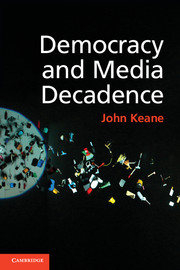5 - Why freedom of public communication?
Published online by Cambridge University Press: 05 June 2014
Summary
Plenty of voices, not just in China, but in many places elsewhere on our planet, think they already know the (positive) answer to this question. They are certain that the ‘liberal’, or ‘Western’ or ‘bourgeois’ principle of freedom of expression is passing out of fashion, or a sham, in that positive talk of communicative abundance is a mask for ugly realities, or a mere diversion from more important political aims and tasks. The critics, whether or not they realise, are supported in their convictions by the various decadent trends now working against communicative abundance. The effects of media decadence speak louder than words. In the early years of the twenty-first century, this decadence sounds the alarm that freedom of communication and its twin, monitory democracy, are neither inevitable nor a necessary and desirable feature of complex political orders. The dialectics of communicative abundance and media decadence prompt discomposing questions: when measured in terms of its positive contributions to monitory democracy and, by contrast, the damaging and disruptive effects of media decadence, does the age of communicative abundance, on balance, proffer more risk than promise for the lives of citizens and their representatives? Since the extent to which people are duped and disempowered by media systems always depends upon many forces, including the chosen actions of citizens and their representatives, are there developing parallels with the early twentieth century, when print journalism and radio and film broadcasting hastened the widespread collapse of parliamentary democracy? Is the media decadence of our age the harbinger of profoundly authoritarian trends that might ultimately result in the birth of phantom democracy, that is, polities in which businesses are publicly unaccountable and governments claim to represent majorities that are artefacts of media, money, manipulation and force of arms? If that happened, what, if anything, would be lost? What exactly is so good about the power of citizens and their representatives to express themselves openly within a variety of institutional settings? In plain words: why should anybody care about media decadence?
- Type
- Chapter
- Information
- Democracy and Media Decadence , pp. 213 - 245Publisher: Cambridge University PressPrint publication year: 2013



